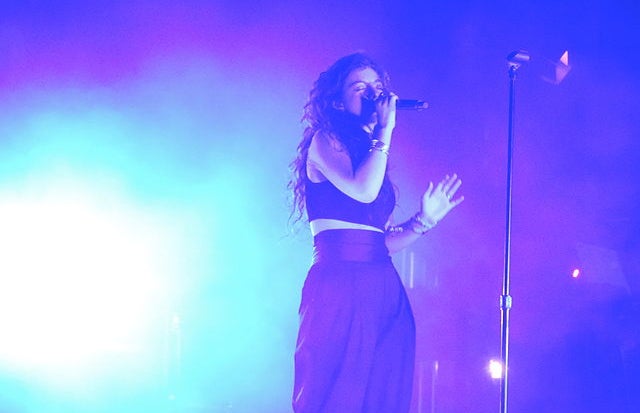It was eight years ago when the beloved electro-pop song “Royals” first permeated the radio stations, and behind it, a young, edgy, curly-haired Ella Yelich-O’Connor (professionally known as Lorde) unknowingly awaiting her rise to fame. Only a month after the hit was released, the singer captured the attention of introspective teens across the globe with her debut album Pure Heroine: a mosaic of online gossip, car rides through unchanging suburban landscapes, and a visceral fear of growing up; a fear that is tenderly resolved in her most recent album Solar Power.
The journey from adolescence to adulthood that is illustrated chronologically throughout Lorde’s work is nothing short of beautiful. In 2017, her sophomore album Melodrama was released: a transition from juvenile grievances to profound heartbreak, euphoric redemption, and the strange feeling of coming into your own as you exit your teenage years. I had the privilege of seeing Lorde perform in Denver for her Melodrama World Tour when I was a freshman in high school, and it was an experience like no other: amidst fluorescent lights and explosions of confetti, there she was, fervidly outpouring the lyrics to songs that I’d memorized very eagerly the year before. As a relatively new fan, I left the concert feeling elated and enraptured; I couldn’t wait for new projects, interviews and music from her.
But none of those things ever came; not for four years, anyway. Shortly after the tour, she took down her Instagram posts, and I saw her name slowly disappear from entertainment headlines. Confused and disheartened, I clung to Melodrama for dear life, trying to preserve the exhilaration I felt at Lorde’s show, wondering if this would be the final album that the young artist would ever release. To my delight, though long-awaited, the pause following her sophomore album emerged as a space carefully cultivated for Solar Power to blossom in all along.
The final lyric on the final track of Melodrama echoes, hauntingly, “You’re all gonna watch me disappear into the sun (“Liability”).” And the promise was not left unfulfilled. I found out that Lorde had retreated to Alaska and New Zealand to embark on a four-year hiatus and social media detox, and at an appropriate time. The pressure to be publicly involved in conversations around the 2020 election and outbreak of COVID-19 was mercifully removed from her agenda, and rightfully so. On her leave, she was working on a collection of songs thoughtful and vulnerable enough to inspire healing from all that went down during her time away.
Unlike Pure Heroine and Melodrama (albums that scaled the charts amongst booming bass, extravagant strings and melancholic piano), Solar Power entered the world quietly and peacefully. Many of the tracks involve Lorde’s dreamy voice floating over inviting guitar riffs and gentle cicadas as she sings about dancing barefoot on a beach, the importance of being environmentally-conscious, and her voyage toward spiritual growth. I imagine her angst-ridden teenage self recoiling out of disgust upon the first listen, appalled that the new Lorde could feel so comfortable getting older and learning to embrace the messy, unpredictable, beautiful string of events that is life. And perhaps current Lorde would have some criticisms of her old self as well; after all, she reveals in her song “The Man with the Axe” that she “thought she was a genius,” but “now she’s twenty-two”. Instead of ruminating on the struggles of being an overly-critical teen like she did when she wrote lyrics like: “We both got a million bad habits to kick / Not sleeping is one / I’m biting my nails (“A World Alone”),” Lorde now celebrates her arrival at adulthood and contentment, singing: “Do your best to trust all the rays of light / Everybody wants the best for you / But you gotta want it for yourself (“Mood Ring”).” Aside from sonic and lyrical content, the contrast between Pure Heroine and Solar Power extends into the visuals surrounding the eras; we see a dark-lipped, serious-faced, black-clothed teen become a wizened, radiant, yellow-sun-dress-wearing sage. In all ways imaginable, Lorde has totally transformed.
When asked about how her recent absence opened doors for such a scaled-back album during an interview for Apple Music, the singer noted: “[Sometimes] I don’t want to be even thinking about work; I want to be thinking about what the tide’s doing, how the fishing is, and what the sun’s doing that day. I’m someone who has to go away and figure it out, and I’ll be back, and I’ll bring you a full universe.” By stepping away from the spotlight to allow herself time to re-invent her sound and experience new stories to tell, Lorde proved, powerfully, that less is sometimes more.


